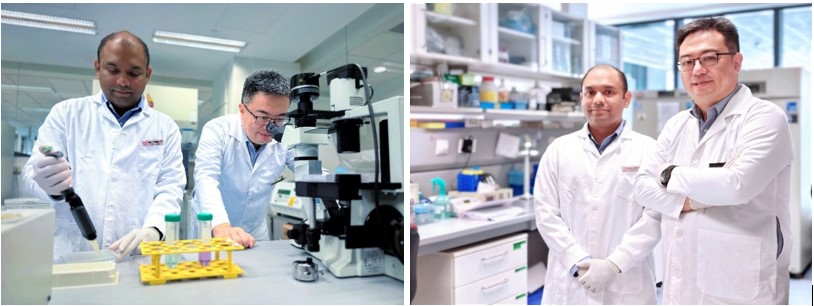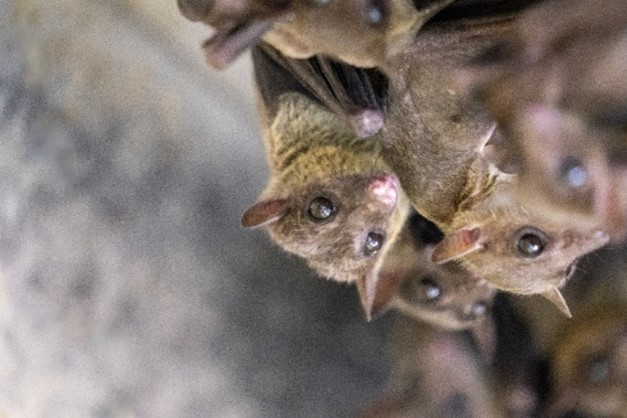SINGAPORE, Sept. 24, 2024 (GLOBE NEWSWIRE) -- In a first of its kind pilot study on the hearts of bats, researchers from National Heart Centre Singapore (NHCS) discovered that bats have the ability to increase the pumping strength of the hearts when in stress. This suggests that the hearts of bats are highly robust and capable of preserving heart function during intense periods of stress and hence are protected against heart failure (HF).
Bat hearts: Superior adaptability to stress
In a collaborative pilot study, researchers from NHCS, in partnership with Duke-NUS Medical School, performed an investigative test to assess the pumping strength of the heart of bats and mice under stress by administering dobutamine, a medication commonly used to stress the heart. The results showed an increased pumping strength in the hearts of bats compared to mice, demonstrating that the bat’s heart may have better functional capacity that is supported by a highly robust heart system.
Bats are the only mammals capable of flight, and studies showed prolonged periods of high heart rates and increased cardiac workload during long hours of flight1. Other evidence also documented the extended lifespan of bats are attributed by their unique genes capable of DNA repair and cell renewal to protect against diseases2. All these findings point to the superior ability of the bats’ heart in adapting their pumping strength during stress and their high functioning heart system enable bats to protect and preserve their hearts from failing.
Investigating bat hearts to advance heart failure prevention
In Singapore, HF is a leading cause of hospitalisation and accounts for 17% of cardiac admissions locally3. As Singapore’s foremost cardiac centre, NHCS sees an estimated 3000 HF patients, offering comprehensive advanced HF management, including medical treatments, extracorporeal membrane oxygenation (ECMO), mechanical heart device implantations and heart transplantations.
Following the preliminary discovery of the pilot study, NHCS is advancing the research through a collaboration with Paratus Sciences Singapore (Paratus) through its "PREVENT-HF” research platform to further investigate the physiology of the bat heart to understand how it adapts to stress and discover new treatments to improve the heart system in humans to potentially effect positive outcomes for individuals with HF.
Beyond clinical care, NHCS has most recently embarked on creating the world’s first Asian patient-specific miniature human heart model, capable of producing key features of HF with preserved ejection fraction (HFpEF)4. With the centre’s expertise in generating human patient-specific beating heart cells, NHCS and Paratus will take this collaboration forward with the aims to identify potential factors that help hearts of bats adapt to stress, validate these factors, and apply the findings in human patient-specific beating heart cells with HFpEF, and lastly, validate the efficacy in preventing HF using mouse models with HFpEF.
Paratus Sciences Singapore, a subsidiary established by Paratus Sciences, is a start-up biotechnology company that unlocks novel disease targets and accelerates drug discovery by leveraging the extraordinary adaptive biology of bats. Paratus Sciences is developing a proprietary discovery platform that integrates cell biology, genomics and informatics. This platform enables Paratus to analyse extensive data and compare patterns of disease resistance and health management in bats with disease development and progression in humans. Through this data-driven comparative analysis, the team from NHCS and Paratus aim to rapidly identify and validate treatment targets. With target identification, Paratus plans to accelerate the development of therapies for human diseases.
Professor Derek Hausenloy, Director, National Heart Research Institute Singapore (NHRIS), NHCS, shared, “We are proud to partner Paratus on this novel initiative to uncover what lies beneath the unique make-up of the hearts of bats that sets it apart from other mammals. There is much we can learn from the bat’s exceptionally high metabolic rate and efficient heart system, and we look forward to identifying the key factors that can protect the human heart and enhance patient outcomes.”
Dr. Theresa G.H. Heah, M.D. MBA, Chief Executive Officer, Paratus Sciences, said, “We are thrilled to embark on this pioneering collaboration with the National Heart Centre Singapore (NHCS). It is a partnership that represents a pivotal advancement in our mission to reveal the genetic and evolutionary edge of bats to accelerate the discovery of human therapeutics. By merging our expertise in bat genomics and drug discovery with the groundbreaking research of NHCS in heart failure, this collaboration underscores our shared commitment to uncover transformative insights that could revolutionize therapeutic strategies and improve outcomes for patients.”
References:
- O’Mara, Wikelski et al. 2017
- Huang, Whelan et al. 2019
- Chan WX, Lin W and Wong RCC. Transitional care to reduce heart failure readmission rates in South East Asia. Cardiac Failure Review 2016; 2: 85–9.
- National Heart Centre Singapore Partners Medera’s Novoheart To Develop Asia’s First Bioengineered Human Heart-In-A-Jar With Heart Failure For Precision Medicine
Media Contact
| Ms Belinda Lim National Heart Centre Singapore Mobile: (65) 9689 7453 Email: belinda.lim.s.m@nhcs.com.sg | Ms Amy Weng National Heart Centre Singapore Mobile: (65) 9740 9926 Email: amy.weng.xueqi@nhcs.com.sg |
Paratus Sciences Singapore media@paratussciences.com |
About the National Heart Centre Singapore
The National Heart Centre Singapore (NHCS) is a 185-bed national and regional referral centre for cardiovascular diseases, and the only centre in Singapore offering heart and lung transplantation programmes. Providing a comprehensive range of cardiac care services from preventive to rehabilitative, NHCS’ clinical outcomes for heart attack treatment, balloon angioplasty with stenting, and coronary bypass surgery, are comparable to international benchmarks. An academic medical institution, NHCS actively trains and educates healthcare professionals to continuously raise the standards of cardiac care, and conducts translational medical research with local and international collaborators to bring about better cardiac health for the community. For more information, please visit: www.nhcs.com.sg
About Paratus Sciences Corporation
Headquartered in New York, NY with a subsidiary in Singapore (Paratus Sciences Singapore), Paratus Sciences is accelerating the discovery of novel therapeutics by leveraging the extraordinary adaptive biology of bats. Our company’s proprietary platform, which fully integrates cell biology, genomics, and informatics, empowers us with massive data inputs through which we are able to compare the evolved patterns of disease resistance and health management in bats with patterns of disease development and progression in humans. Through this comparative exploration and analysis, we aim to rapidly and systematically identify novel targets and develop innovative therapeutics across a spectrum of therapeutic areas. Paratus is also committed to supporting the bat research community through its division, the Bat Biology Foundation.
Paratus is backed by a top-tier investor syndicate, including Polaris Partners, ARCH Venture Partners, ClavystBio, EcoR1 Capital, Leaps by Bayer, and Alexandria Venture Investments.
Visit paratussciences.com or follow us on LinkedIn to learn more.
Annex

(L-R): Assistant Professor Chrishan Ramachandra, Junior Principal Investigator, and Professor Derek Hausenloy, Director, from National Heart Research Institute Singapore (NHRIS), NHCS.
Click to access the hi-res version of the top and bottom images.

Cave nectar bats were used in pilot studies by NHCS and Duke-NUS Medical School to assess its hearts’ pumping strength under stress.
Click here to access the hi-res version of the image.
The following are still images taken of the echocardiograms (i.e. ultrasound to create images of the heart) of the bat’s heart. They show the two-dimensional (2D) short-axis view of the left ventricle (LV) chamber, before and after dobutamine administration. Both images show a moment during a contraction of the bat’s heart.

(L-R): Echocardiograms of the bat’s heart, showing before and after dobutamine administration respectively.
On the left image, there is a small gap in the middle of the LV chamber during a contraction of the heart. On the right, the LV chamber is completely closed during contraction, suggesting a more powerful pump of blood.
Click to view the videos of the echocardiograms - before and after dobutamine administration.
Photos accompanying this announcement are available at
https://www.globenewswire.com/NewsRoom/AttachmentNg/3c7b92e4-3cce-47d0-b910-211588241612
https://www.globenewswire.com/NewsRoom/AttachmentNg/49660204-921e-469e-a507-1092efc68523
https://www.globenewswire.com/NewsRoom/AttachmentNg/5ed9080b-a617-4ae7-9fca-76e4dd516d00

source: Paratus Sciences Corporation
【香港好去處】etnet全新頻道盛大推出!全港最齊盛事活動資訊盡在掌握!► 即睇






























